UK Elections - Never Mind the Ballot Box, Who's Winning in the Inbox?
29 Nov 2019
This article is written by Guy Hanson who is a member of the Email Council.
The last December election was in 1923, and there’s a reason for this – bad weather and dark nights make canvassing a load tougher, with potential voters far less inclined to open their doors. Because email is such a trusted channel, it probably stands a much greater chance of getting political messages across voters’ doorsteps, and is perhaps an even more critical communication channel this election because of this!
The starting gun has been fired for the UK elections. This is the first time voters have been to the polls post-GDPR, and Elizabeth Denham (the Information Commissioner) has already reminded the political parties of their data protection obligations – and the £17M potential fine should they fail to comply!
While there is a greater focus on social media strategies (and spend), email has previously acted as a great bellwether for voter sentiment and intention. I’ve registered with 7 of the main political programs. in the first post of this series, we’ll evaluate the main programs against a set of important sign-up requirements and best practices.
Cookies
The law is clear – “You must tell people if you set cookies, clearly explain what the cookies do and why, and you must get the users’ consent which must be actively and clearly given.”
6 of the 7 websites have cookie statements, and each provides at least a top-level explanation of why they are used and a link to the cookie policy. However, only 4 require active consent.
Best compliance came from the Brexit party, with a detailed explanation of their purpose, clear acceptance required from users, and granularity of choice around which types of cookie users are consenting to.
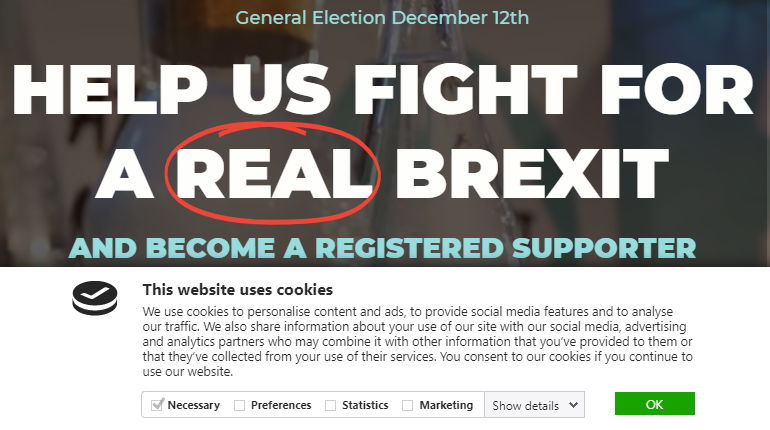
Address Validation
Email address validation is widely considered best practice, ensuring only functioning addresses are accepted. Senders benefit from reduced Unknown User rates, which positively impacts on sender reputation metrics. Performance metrics also improve because programs are only accepting subscribers with a genuine intention to engage.

Only the Conservative Party has integrated address validation (although it’s advisory, not compulsory, and subscribers can still sign up with a bad address!). This represents a missed opportunity by the other parties, who should consider using a solution like BriteVerify.
Legal Basis
The legal bases the political parties rely on to process personal data includes consent, legitimate interest; contractual necessity; and public interest (promoting democratic engagement). Remember political parties also process “special category” data (e.g. ethnicity, political orientation, etc. which imposes a higher duty of care.
Specifically for email communications, four programs rely on consent as their legal basis, three on legitimate interest, and one uses public interest. Interestingly, at least one sender relying on LI is clearly consent for email sign-ups, suggesting there is still confusion around the different bases.
The best sign-up form is the Liberal Democrats:
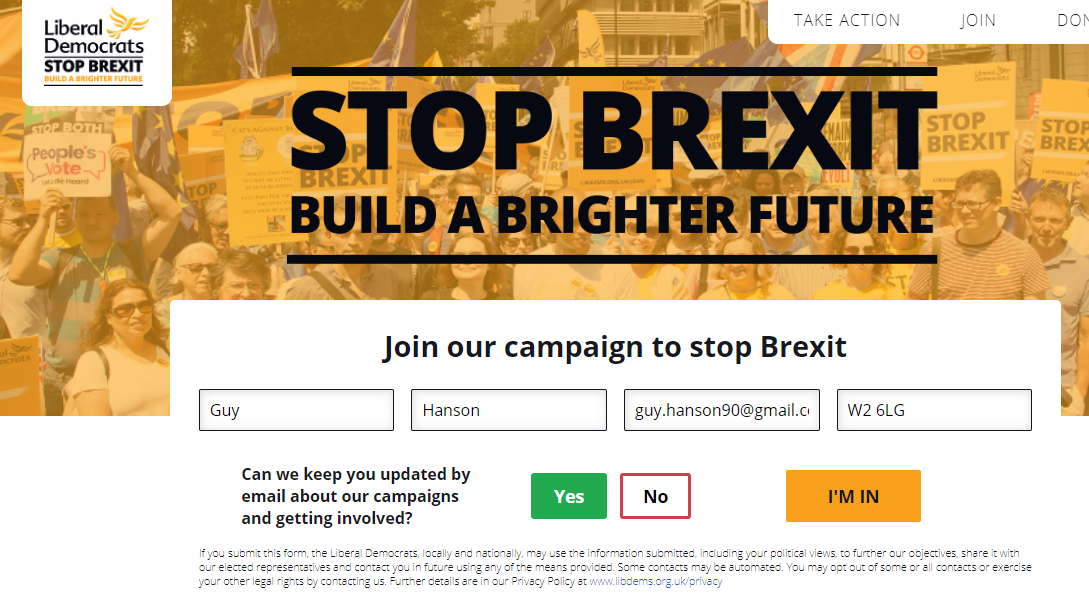
Note the following:
- Subscribers are put at the heart of the conversation (“Can we keep you updated . . . “)
- Use of “Yes” and “No” opt-in boxes to ensure a decision
- Positive language to “nudge” new subscribers to commit (“I’m in”)
- Top-level information about personal data, plus the right to opt-out
- Link to the privacy policy
Privacy Policy
All the political parties have clearly invested a great deal of time and effort into their privacy policies – perhaps reflecting Mrs Denham’s “encouragement!.” Most contain sections covering what personal data is held, why it is required, what legal basis is being used, how the key principles of data protection are observed, and how data subjects can register concerns/complaints.
These documents are reasonably lengthy (only 1 is shorter than 10 pages) and there is definitely a sense of “eyes glazing over” as readers plough through in a Sisyphean quest to gauge how their personal data is being used! To measure this, I used a test called the Gunning Fog Index. This is a readability test that considers factors such as size of, average length of sentences and complexity of words. Here are the results for the political privacy policies:
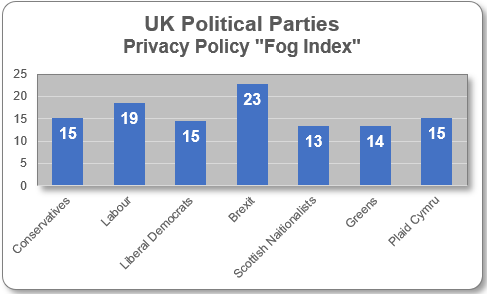
The index estimates years of formal education needed to understand the text. A score of 12 requires A-level capabilities while 17 means university graduate-level reading skills! Guidelines state “text for a wide audience generally needs a fog index less than 12, while text requiring near-universal understanding generally need an index less than 8” – the political parties clearly have room for improvement!
Welcome!
The established practice is to welcome new members to your community, and thank them for joining. The performance of the political parties was especially disappointing. Only two1 provided immediate acknowledgement, while a third did at least send their first email on the same day.
The Conservatives are the only program using double opt-in. DOI is the gold standard for opt-in, and features as part of Return Path’s Certification standards. It ensures genuine email addresses are provided, important given the high levels of bot signups that are now prevalent.
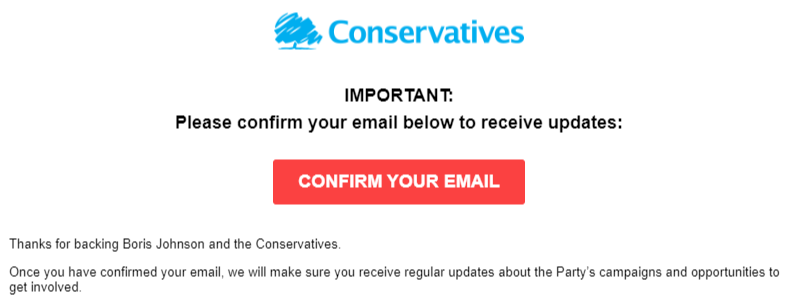
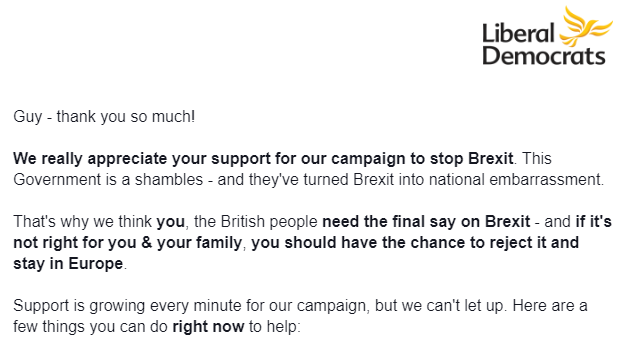
While the Labour Party didn’t provide a welcome email, their first communication asks new subscribers to complete a short questionnaire that will be used “to shape our plans, campaigns and how we communicate with you.”
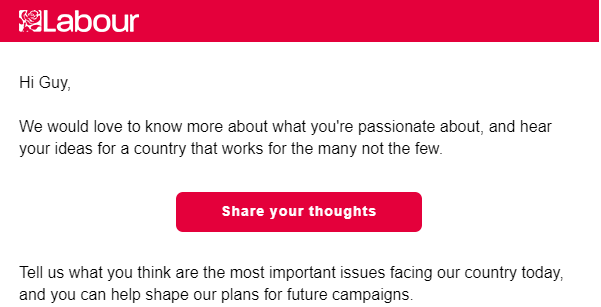
- Caveat: I am aware that at least one more program may indeed send welcome emails, but I never received them. This is because some programs are using multiple sign-up forms, but not all of them trigger welcome emails. It could also be as a result of deliverability issues (although I did check my spam folders!). Either way, at the end of the day it’s all about the user experience – I signed up, and I didn’t receive a welcome email.
In Summary
One never gets a second chance to make a great first impression, and this absolutely holds true for email programs. The way data is collected, expectations are set, choice is provided, and a welcome is proffered all establish the tone of the new relationship. I scored each program against the factors reviewed, using a scale of 0 to 4, where 0 is completely absent and 4 is best-in-class:

We can see the Conservatives and Liberal Democrats are setting the most solid foundation for the trusted relationships they are seeking to build. In upcoming posts, we’ll consider the relationship between this foundation, and the subsequent levels of engagement these programs achieve.
- Evaluation Criteria:
- Cookie statements: Points for meaningful description; granularity of choice; active opt-in; link to cookie policy
- Address validation: Conservatives deducted 1 point for validation not being mandatory.
- Sign-up form: Points for immediate visibility, unbundled consent, active opt-in, meaningful description
- Privacy policy: Fog index - <=12 (4), <= 15 (3), <= 18 (2), otherwise (1)
- Welcome email: Points for double opt-in, thanking subscribers, setting expectations; providing choice/interests
Please login to comment.
Comments